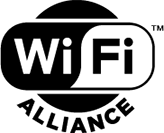Surveyrespondents indicated a strong association of the Wi-Fi CERTIFIED brand withinteroperability and security, two of the testing program's core elements. Sixtypercent of total respondents associated Wi-Fi CERTIFIED with interoperability,while 54 percent associated it with the latest security protections.
The Wi-FiAlliance program has experienced extraordinary acceptance as Wi-Fi technologyhas gained momentum and popularity. Extending beyond traditional Wi-Fi-enabledlaptops, the report also indicates that consumers are very likely to considerother Wi-Fi CERTIFIED electronic devices including mobile phones, printers anddigital cameras. Additional results from the brand awareness survey:
- Eighty-two percent of U.S.consumers are likely to buy products beyond laptop computers that areWi-Fi CERTIFIED. Seventy percent responded that they would be likely tobuy a Wi-Fi CERTIFIED mobile phone.
- Fifty-six percent of Japaneserespondents that are aware of Wi-Fi suggested that it is a good way toconnect devices within the digital home.
- Seventy-nine percent of U.K.consumers who are aware of the Wi-Fi CERTIFIED brand indicated they wouldchoose a certified product over a non-certified product when shopping fora laptop computer.
- In China, 90 percent of consumersaware of Wi-Fi CERTIFIED said they would pay more for a certified productover one that is not; 73 percent of those respondents would pay more formobile phone that has been Wi-Fi CERTIFIED.
Sixty-fourpercent of respondents indicated they would pay more for non-traditional Wi-FiCERTIFIED products such as mobile phones, digital cameras and MP3 players, thansimilar products that are not certified. Of those respondents, a majority saidthey would pay a premium of up to 10 percent more for a Wi-Fi CERTIFIED device.In the U.S., China and Japan, willingness to pay a premiumwas due to the recognition that an independent third party is watching out forconsumers' best interests. In the U.K., consumers' willingness to paymore is attributed to Wi-Fi CERTIFIED products' reliability and high quality.
"Ourrigorous certification program helps assure users that their Wi-Fi devices havebeen tested to work together," said Karen Hanley,senior director for the Wi-Fi Alliance. "The results of this study reaffirm thesuccess of the program and the positive experiences consumers have with Wi-FiCERTIFIED products."
The Wi-Fi CERTIFIED seal can be placedon products that have been tested and certified for interoperability andsecurity by the Wi-Fi Alliance. Developed in March 2000, the certificationprogram was established to help ensure a positive consumer experience withWi-Fi products and to enable the growth of the segment. To date, more than3,500 products have undergone that rigorous testing and been designated asWi-Fi CERTIFIED.
The Millward Brown Web-basedresearch study, conducted in June 2007, surveyed more than 1,200 broadbandInternet users in the U.S., China, Japan and U.K. Respondents were froma nationally-balanced and demographically representative sample of adult consumerswith awareness of wireless technology.
About theWi-Fi Alliance
TheWi-Fi Alliance is a global, non-profit industry association of morethan 300 member companies devoted to promoting the growth of wirelessLocal Area Networks (WLANs). With the aim of enhancing the user experience formobile wireless devices, the Wi-Fi Alliance's testing and certificationprograms ensure the interoperability of WLAN products based on the IEEE 802.11specification. Since the introduction of the Wi-Fi Alliance'scertification program in March 2000, more than 3,500 productshave been designated as Wi-Fi CERTIFIED™, encouraging the expanded useof Wi-Fi products and services across the consumer and enterprise markets.www.wi-fi.org
Mediacontact: Edelmanfor Wi-Fi Alliance: Michael Diamond, michael.diamond@edelman.com, +1 650-429-2772.
About Millward Brown


